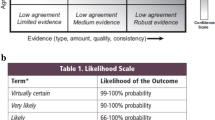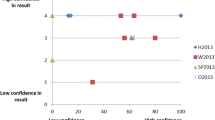Abstract
The uncertainty language framework used by the Intergovernmental Panel on Climate Change (IPCC) is designed to encourage the consistent characterization and communication of uncertainty between chapters, working groups, and reports. However, the framework has not been updated since 2010, despite criticism that it was applied inconsistently in the Fifth Assessment Report (AR5) and that the distinctions between the framework’s three language scales remain unclear. This article presents a mixed-methods analysis of the application and underlying interpretation of the uncertainty language framework by IPCC authors in the three special reports published since AR5. First, I present an analysis of uncertainty language term usage in three recent special reports: Global Warming of 1.5°C (SR15), Climate Change and Land (SRCCL), and The Ocean and Cryosphere in a Changing Climate (SROCC). The language usage analysis highlights how many of the trends identified in previous reports—like the significant increase in the use of confidence terms—have carried forward into the special reports. These observed trends, along with ongoing debates in the literature on how to interpret the framework’s three language scales, inform an analysis of IPCC author experiences interpreting and implementing the framework. This discussion is informed by interviews with IPCC authors. Lastly, I propose several recommendations for clarifying the IPCC uncertainty language framework to address persistent sources of confusion highlighted by the authors.



Similar content being viewed by others
Notes
For a more detailed discussion of Aven’s (2019) interpretation of the confidence and likelihood scales, see the Supplementary Material.
Source: interviews with members of the IPCC Bureau.
The analysis preceded the publication of the final drafts of the SRCCL and SROCC and is based on the “approved drafts,” which were subject to final edits and tricklebacks. Trickleback documents for the SRCCL and SROCC contain only 25–30 suggested revisions associated with uncertainty language each. Therefore, the term usage in the final drafts may vary slightly from the data used in this analysis but will not significantly affect the findings presented here.
The IPCC author database does not provide information on author participation in the FAR, SAR, or TAR.
Interviews by chapter/group: SRCCL Ch. 4 (4); SRCCL Ch. 6 (2); SROCC Ch. 2 (3); SROCC Ch. 5 (3); IPCC Bureau (2). Interview requests were sent to all CLAs and LAs for each chapter and were conducted with all individuals that responded.
A series of final revisions of report chapters following the SPM approval meetings.
A sentiment that is not echoed by many risk/uncertainty scientists (Aven 2019).
References
Adler CE, Hirsch Hadorn G (2014) The IPCC and treatment of uncertainties: topics and sources of dissensus. Wiley Interdiscip Rev Clim Chang 5:663–676
Aven T (2019) Climate change risk–what is it and how should it be expressed? J Risk Res:1–18. https://doi.org/10.1080/13669877.2019.1687578
Aven T, Renn O (2015) An evaluation of the treatment of risk and uncertainties in the IPCC reports on climate change. Risk Anal 35:701–712
Beck S, Mahony M (2018) The IPCC and the new map of science and politics. Wiley Interdiscip Rev Clim Chang 9:e547
Borges de Amorim P, Chaffe PB (2019) Towards a comprehensive characterization of evidence in synthesis assessments: the climate change impacts on the Brazilian water resources. Clim Chang 155:37–57
Committee to Review the Intergovernmental Panel on Climate Change (2010) Climate change assessments: review of the processes and procedures of the IPCC
Curry J (2011) Reasoning about climate uncertainty. Clim Chang 108:723–732
Helgeson C, Bradley R, Hill B (2018) Combining probability with qualitative degree-of-certainty metrics in assessment. Clim Chang 149:517–525
IPCC (2005) Guidance notes for lead authors of the IPCC Fourth Assessment Report on addressing uncertainties. Geneva, Switzerland
IPCC (2018) Summary for Policymakers. In: Masson-Delmotte V, Zhai P, Pörtner HO et al (eds) Global warming of 1.5°C. An IPCC Special Report on the impacts of global warming of 1.5°C above pre-industrial levels and related global greenhouse gas emission pathways, in the context of strengthening the global response to the threat of climate change. World Meteorological Organization, Geneva
IPCC (2019a) Summary for policymakers (approved draft). In: IPCC Special Report climate change, desertification, land degradation, sustainable land management, food security, and greenhouse gas fluxes in terrestrial ecosystems In press
IPCC (2019b) Summary for policymakers. In: Pörtner HO, Roberts DC, Masson-Delmotte V et al (eds) IPCC Special Report on the ocean and cryosphere in a changing climate In press
IPCC (2019c) IPCC authors (beta). https://archive.ipcc.ch/report/authors/. Accessed 1 Nov 2019
Jonassen R, Pielke R (2011) Improving conveyance of uncertainties in the findings of the IPCC. Clim Chang 108:745–753
Jones RN (2011) The latest iteration of IPCC uncertainty guidance: an author perspective. Clim Chang 108:733–743
Kowarsch M, Jabbour J (2017) Solution-oriented global environmental assessments : opportunities and challenges. Environ Sci Pol 77:187–192
Mach KJ, Mastrandrea MD, Freeman PT, Field CB (2017) Unleashing expert judgment in assessment. Glob Environ Chang 44:1–14
Mastrandrea MD, Mach KJ (2011) Treatment of uncertainties in IPCC Assessment Reports: past approaches and considerations for the Fifth Assessment Report. Clim Chang 108:659–673
Mastrandrea MD, Field CB, Stocker TF, et al (2010) Guidance note for lead authors of the IPCC fifth assessment report on consistent treatment of uncertainties
Mastrandrea MD, Mach KJ, Plattner GK et al (2011) The IPCC AR5 guidance note on consistent treatment of uncertainties: a common approach across the working groups. Clim Chang 108:675–691
Morgan MG (2014) Use (and abuse) of expert elicitation in support of decision making for public policy. PNAS 111:7176–7184
Moss R, Schneider S (2000) Uncertainties in the IPCC TAR: recommendations to lead authors for more consistent assessment and reporting. In: Pachauri R, Taniguchi T, Tanaka K (eds) Guidance papers on the cross cutting issues of the Third Assessment Report of the IPCC. World Meteorological Organization, Geneva, pp 33–51
Nearing GS, Tian Y, Gupta HV et al (2016) A philosophical basis for hydrological uncertainty. Hydrol Sci J 61:1666–1678
Oppenheimer M, Neill BCO, Webster M, Agrawala S (2007) The limits of consensus. Science 317(80):1505–1507
Swart R, Bernstein L, Ha-Duong M, Petersen A (2009) Agreeing to disagree: uncertainty management in assessing climate change, impacts and responses by the IPCC. Clim Chang 92:1–29
Winsberg E (2018) Philosophy and climate science. Cambridge University Press, Cambridge
Wüthrich N (2017) Conceptualizing uncertainty: an assessment of the uncertainty framework of the Intergovernmental Panel on Climate Change. In: Massimi M, Romeijn J-W, Schurz G (eds) EPSA15 Selected papers: the 5th conference of the European Philosophy of Science Association in Düsseldorf. Springer, pp 95–107
Author information
Authors and Affiliations
Corresponding author
Additional information
Publisher’s note
Springer Nature remains neutral with regard to jurisdictional claims in published maps and institutional affiliations.
Electronic supplementary material
ESM 1
(DOCX 22 kb)
Rights and permissions
About this article
Cite this article
Janzwood, S. Confident, likely, or both? The implementation of the uncertainty language framework in IPCC special reports. Climatic Change 162, 1655–1675 (2020). https://doi.org/10.1007/s10584-020-02746-x
Received:
Accepted:
Published:
Issue Date:
DOI: https://doi.org/10.1007/s10584-020-02746-x




